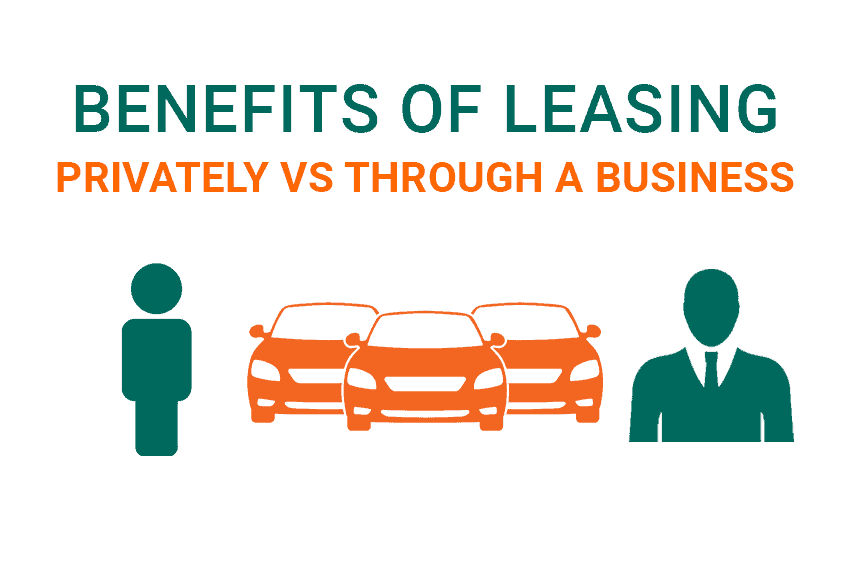Are you finding it difficult to decide whether to lease it privately or through your business?
There are advantages to each, and without all the information in front of you, it can be hard to make the right decision.
But that’s where we come in. In this article, we’re going to outline the differences between leasing privately and through a business and the benefits of each.
What is the difference between leasing privately and leasing through a business?
Firstly, let’s look at the difference between the two.
To be honest, they are both pretty self-explanatory. Leasing privately is the same as personal leasing, so your business or your work has nothing to do with it. There are two different types of lease agreements;
- Personal Contract Hire
- Personal Contract Purchase

There is also hire purchase, but that is a finance agreement as opposed to a lease agreement.
Personal contract hire is where you have a car for a set period of time, between 2 and 5 years usually, while paying a set amount every month. Once that time is up, you hand the car back with nothing else to pay (subject to fair wear and tear and mileage restrictions).
Personal contract purchase is a bit different. It’s essentially the same as a contract hire except for what happens at the end. At the end of a personal contract purchase, you have three options;
- Hand the car back with nothing else to pay
- Pay a final balloon payment and own the car
- Part exchange the car
The choice is yours.
So, that’s what a personal lease is. It has nothing to do with your business or your place of work, you are free to do what you please.

A business lease, however, is done through your business. Whether it is your business or it is a perk of the job, a company car comes with many perks (which we’ll go into more detail about in a bit).
There are four different types of lease and finance agreement when you get a company vehicle. These are:
- Business Contract Hire
- Business Contract Purchase
- Finance Lease
- Operating Lease
Business contract hire and business contract purchase are exactly the same as their personal leasing counterparts. Finance lease and Operating lease are finance agreements, which you can find out more information on in our article here.
What are the benefits of leasing a car privately?
There are quite a few advantages to leasing a car privately. For example;
- You get to have a new car every couple of years
- This is one of the biggest benefits of leasing a car as you get to hand your car back and get a shiny brand new one after a few years.
- You can drive a nicer car for less money than you would think
- Leasing tends to be cheaper than buying or getting a finance agreement. This means that you can be driving around in a car much nicer to one than you would be if you were to buy
- Road tax is usually included
- This is just one less thing to worry about when it comes to it
- You don’t have to pay company car tax
- Another benefit of choosing to lease privately is that you don’t have to pay company car tax (we’ll talk more about this in a bit)
So there are just some of the benefits of leasing a car privately.
What are the benefits of leasing a car through a business?
There are benefits to leasing a car through a business that you do not get privately. For example;
- There tend to be better deals for business users than there is for personal
- There are a few reasons for this, but for more information, you can read our article on why business contract hire is cheaper than personal contract hire here.
- If you have a business contract hire, the car can be an “off-balance sheet” which is beneficial to many.
- Or, if you go through a finance lease you can offset 50% of the VAT on a car and 100% of the VAT on a van. Again, this is extremely appealing to many business users.
- While you have to pay company car tax, this can still be cheaper than if you were to do it personally.
- If you were to get a van or a pickup, then you only have to pay a fixed rate for company car tax, which can be quite a lot less than if you were to lease privately. Again, more on that in a little bit.
So you can see that there are benefits to leasing through a business and leasing privately.

Business leasing and company car tax
If you are leasing through your business and you are using your vehicle for personal journeys (including to and from work) then you will have to pay company car tax.
Company car tax is based on three things;
- The amount of CO2 your car emits
- The P11d value of the car
- Your personal tax bracket
The general rule is; the higher the CO2 emissions = the higher the company car tax.
We have a whole article dedicated to company car tax, and for more information, you can head there.
Company car tax and a van
If you are looking to lease a van, then things are slightly different. Your company car tax is not based on how much CO2 your car emits or the P11d value but instead is a fixed rate. This means that you will pay either 20% or 40% of this rate depending on your personal tax bracket. It’s just that simple. This also applies if you have a pickup. If a pickup meets set criteria by the HMRC then you will be taxed on it as if it were a van. Why is this beneficial? It means that how much you will be paying will be considerably lower than if it were taxed as a car.
You can find out more about company car tax for pickups here.
Company Car Tax Changes 2021
In the 2016 Autumn Statement, it was announced that there would be some changes to company car tax. Those familiar with company car tax will know that you are given a BIK rate. This is a benefit-in-kind rate which is how much you will have to pay in company car tax. The BIK rate pretty much depends on how much CO2 your vehicle emits. The lower the CO2, the lower the BIK rate.
But for a long time, there weren’t that many BIK bands on the lower end of the scale. This means that it was quite a bit cheaper to get a car that was low emission than it was to get a car with higher emissions. This was the point, obviously, and it encouraged companies to invest in low emission vehicles.
What does this mean for company car drivers? Those who opt to drive an electric or plug-in hybrid vehicle pay astronomically less company car tax than drivers of petrol and, in particular, diesel cars. However, this is changing year on year. From April 2021 the company car tax rate increased to 1% for EVs, and next year this rises to 2% in total. For plug-in hybrid cars (PHEV) you’ll see the rate grow to 14% by April 2022.
To find out more about the new company car tax bands you can read our article here.
Private leasing vs. business leasing; which is more tax-efficient?
This is an interesting question and one we get quite often.
In all honesty, it’s hard to say. It depends on what sort of car you’re looking at. For example, if you are looking for a car that emits a lot of CO2 and has a high P11d value, then leasing privately is probably more tax efficient. If you were looking at something like a Range Rover Evoque, for example. It would cost you so much in company car tax it outweighs the fact that the car can be an “off-balance sheet”.
However, if you fancy yourself a Nissan Leaf, or a BMW i3 or even a luxury plugin hybrid, then, while you still have to pay company car tax, you will be paying less. And, you’ll have the benefits of going through a business.
If you want the benefits of going through a business but you also want a car that emits quite a bit of CO2 and you don’t want to have to pay a lot in company car tax, then you could think about getting a van or a pickup. Though we understand that isn’t a viable option for everyone, it is still an option.
Hopefully, you now have a better idea of the benefits of both leasing privately and through a business. There are benefits to both, and whichever you choose should be the best option for your situation. If you are unsure which is the best solution for you, our team of experienced Vehicle Specialists are on hand to guide you through your vehicle journey and help you make an informed decision.


